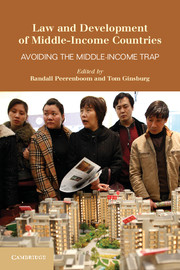Book contents
- Frontmatter
- Contents
- List of Contributors
- Acknowledgments
- 1 Law and Development in Middle-Income Countries
- Part I The Politics of Development in Middle-Income Countries
- 2 The Politics of Law and Development in Middle-Income Countries
- 3 When Does “Politics” Get in the Way of Development?
- Part II Middle-Income Countries in a Globalized Economy
- Part III Good Governance and the Rule of Law in Middle-Income Countries
- Part IV Socioeconomic Challenges in Middle-Income Countries
- Part V International Donor Strategies for Middle-Income Countries
- Appendix Selected Country Data as of 2011
- Index
- References
3 - When Does “Politics” Get in the Way of Development?
The Developmental State, Good Governance, and Liberal Democratic Change in Malaysia and Singapore
Published online by Cambridge University Press: 05 June 2014
- Frontmatter
- Contents
- List of Contributors
- Acknowledgments
- 1 Law and Development in Middle-Income Countries
- Part I The Politics of Development in Middle-Income Countries
- 2 The Politics of Law and Development in Middle-Income Countries
- 3 When Does “Politics” Get in the Way of Development?
- Part II Middle-Income Countries in a Globalized Economy
- Part III Good Governance and the Rule of Law in Middle-Income Countries
- Part IV Socioeconomic Challenges in Middle-Income Countries
- Part V International Donor Strategies for Middle-Income Countries
- Appendix Selected Country Data as of 2011
- Index
- References
Summary
INTRODUCTION
The “developmental state model” is often used to describe the political economic model that led to modernization and economic development in postwar Japan, South Korea, and Taiwan, countries that have transitioned to high-income economies. This chapter examines the role of the developmental state in two cases in Southeast Asia, Singapore (a high-income economy) and Malaysia (an upper middle-income economy). Using the analytical tool of the “developmental state,” this chapter will discuss the complex ways in which development has been shaped by the role of the state and the “politics” of development in each of these cases, with implications for political liberalization in the direction of liberal democratization.
THE “DEVELOPMENTAL STATE MODEL”
The “developmental state” has been identified as being “the distinctive East Asian contribution” to the field of international political economy. Challenging the market fundamentalism associated with neoliberal economic policies (such as those attributed to the Washington Consensus), the developmental state model “brings the state back in” as “an active agent in economic development.” As one scholar succinctly put it, “[a]t its simplest, the developmental state has become a generic term to describe governments that try to actively ‘intervene’ in economic processes and direct the course of development, rather than relying on market forces.”
- Type
- Chapter
- Information
- Law and Development of Middle-Income CountriesAvoiding the Middle-Income Trap, pp. 36 - 56Publisher: Cambridge University PressPrint publication year: 2014



